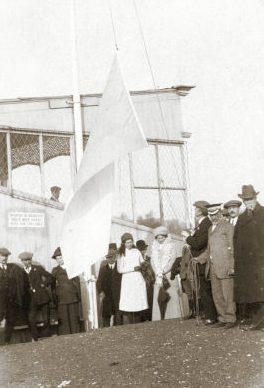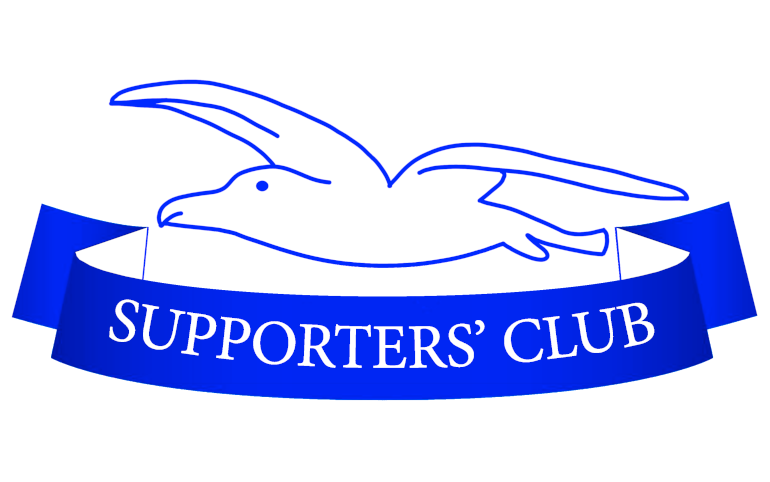History
Originally launched in March 1912, Brighton & Hove Albion Supporters’ Club is now in its fourth incarnation. Our current organisation was formed on 17 September 1982.

The decades since 1982 have seen some monumental events in Albion’s history:
- FA Cup final (1983)
- Financial crisis (1992–93)
- Premature sale of the Goldstone Ground (1995)
- Campaign to oust discredited directors (1995–97)
- Football League survival at the death (1997)
- Playing at Gillingham for two years (1997–99)
- Prolonged campaign for a new stadium at Falmer (1998–2007)
- Temporary ground at Withdean Stadium (1999–2011)
- Three championships won (2001, 2002 and 2011)
- Play-off final victory (2004)
- Opening of the new stadium (2011)
- Promotion to Premier League (2017)
- Qualifying for the Europa League (2023)
Yet throughout those turbulent times the Supporters’ Club maintained its core values: assisting the Albion when required, and helping Albion fans to support – and sometimes save – their club.
Indeed, it has always supported non-divisive campaigns – working in harmony with others while providing the organisation, manpower, finance and often the leadership to see them successfully through to completion.

In March 2012, we celebrated our centenary. Exactly one hundred years to the day since the original Supporters’ Club was launched we held an event in Dick’s Bar at the Amex Stadium – a successful quiz night in aid of a local community project in the neighbourhood of the arena.
It was most fitting that such a celebratory event should be held at the venue that members and other fans had done so much to secure – by convincing the powers-that-be that it was wanted, needed and in the public interest.
You can click on the summary chapters below for an outline of our proud history.
See also our Timelines for greater detail of what we’ve been up to since 1912.
We also have lists of our Chairmen and Chairwomen since 1982, and of our Away Players of the Season.
Brighton & Hove Albion Supporters’ Club – more than a century of work for the Albion and Albion fans.
To Help, Not Hinder
The former motto of the Supporters’ Club reflected its philosophy for many years. It took fans to away games, ran social events and donated money to the Albion, but had little ambition to influence decisions. After all, fans knew that directors always acted in the best interests of the football club …
The first Supporters’ Club was launched on 27 March 1912, the initiative of fan Harry Edwards who was influenced by the successful Watford SC. It was just eleven years after the birth of the Albion itself, but three years later, with the country at war, the football club closed down until 1919.
Re-formed in July 1922, the Supporters’ Club established a long-term home at the Ship Hotel in Hove Street. Transport was regularly arranged to away games, and with Albion ensconced in the Third Division (South) very few matches were more than 200 miles away.
The Supporters’ Club raised funds for the football club, notably through the publication of annual handbooks. It encouraged fans to buy shares in The Brighton & Hove Albion Football Club Ltd, enabling the Goldstone Ground to be purchased outright in 1930.
But its greatest achievement of the period was the funding of a roof behind the north goal. The Goldstone Ground’s first North Stand opened in 1931.
The Supporters’ Club was an organisation with prestige. The secretary, John Talbot Nanson, was Mayor of Brighton for three years, while Charles Brown, the Albion chairman, was an elected committee member.
Post-war revival
Following the Second World War, the Supporters’ Club was revived in March 1948 and soon reached a peak membership of 5,000 as football attendances boomed.
Funds were raised through the sale of souvenirs from huts within the Goldstone Ground, and “Albion Weeks” were staged to stimulate interest. The Supporters’ Club ran lotteries so successfully that it handed up to £20,000 a year to the “parent club” — and this at a time when a player’s maximum wage was £20 a week.
Coach travel to away games took off in the 1950s with members enjoying reciprocal hospitality with the home team’s supporters’ club.
Social events included an annual football queen contest, while members could also join both ladies’ and men’s football teams.
The Supporters’ Club continued to help fund modest improvements to the Goldstone Ground, but it also sought to improve the fans’ lot, for instance by seeking reduced admission prices for old-age pensioners.
By the mid 1970s the Supporters’ Club was still raising £10,000 a year for the football club despite a smaller membership. However, Albion, under chairman Mike Bamber, began to adopt a more professional approach to the commercial side of the game and took over many of the Supporters’ Club’s traditional functions in 1977. As a result, the Supporters’ Club decided to close down.
A Club Re-Born
After a gap of five years, the present Supporters’ Club was launched on 17 September 1982.
It continued to raise money for the benefit of the Albion and its supporters. Thousands of pounds were spent on a physiotherapy unit, on a heart defibrillator, and on a roof for disabled supporters at the Goldstone. There were programme fairs, charity collections, sponsored walks and a fans’ football team. The newly-formed Junior Seagulls initially came under the wing of the Supporters’ Club.
But it also began campaigning. While others battled against managers and sometimes opposing fans, the Supporters’ Club confined its crusades to promoting good behaviour and encouraging fun, and to non-divisive issues: the Government’s national membership scheme (1988–89) and, amid the financial crisis of 1992–93, Save The Albion Now.
Then, in 1995, came the seminal moment in the modern history of the Albion: the sale of the Goldstone Ground.
The Supporters’ Club threw its weight behind the united campaign to install a new board of directors. Some said it wasn’t radical enough, yet it proposed a blanket boycott of home games and began legal action against the FA. And when the football club ended coaches to away games, the Supporters’ Club took over the running of them.
After two years of “civil war”, Dick Knight became Albion chairman, and a popular, imaginative board took control of the football club.
Declaration of Independence
The Supporters’ Club re-wrote its constitution in 1997 to emphasise its independence and democratic principles. While co-operating and liaising with the Albion whenever possible, it has maintained a healthy distance and a watchful eye ever since. Members cherish its independence and the right to criticise.
Over the next ten years or so the Supporters’ Club campaigned tirelessly on any number of issues, from Bringing Home the Albion and keeping it “Alive and Kicking”, to targeting homophobia and other anti-social behaviour. Proudly, it funded the supporters’ campaign for a new stadium to the tune of more than £10,000 and provided much of the manpower in connection with this, the most important initiative in the history of Albion fans.
It backed its members’ initiatives such as the Buy-a-Player Fund (for Rod Thomas in 1998) and the promotion of youth development. It campaigned on behalf of other clubs in crisis, giving very practical assistance to Hull City, Bury, Wrexham and Plymouth Argyle among others.
The Supporters’ Club continued to run transport to away games. It provided most of the manpower for Withdean’s litter patrols, and for decorating open-top buses for triumphal processions through the city. And again it partly funded and maintained a cover for disabled supporters, this time at Withdean Stadium.
For the Benefit of All Fans
The Supporters’ Club has sometimes been derided as being an irrelevance, but much of its work goes on in the background for the benefit of all fans, not just members. Without the Supporters’ Club, for instance, a draconian Away Membership Scheme would have been imposed on fans in 2000, and there would have been no £5 compensatory voucher at Norwich in 2003.
One spectacular success was gaining the FA’s backing for outlawing homophobic chanting as a result of the Supporters’ Club’s lengthy campaign.
Dick Knight, Martin Perry, Tony Bloom, Derek Chapman, Steve Gritt, Mark McGhee, Gus Poyet and Derek Allan have all received mementoes from us for their outstanding contributions to the Albion; and since 2002 the Supporters’ Club has given an annual Merit Award to those contributing most to the cause of Albion fans. In 2004, the Supporters’ Club itself received an award from the national Football Supporters’ Federation for its work.
Alongside John Baine, the Supporters’ Club lobbied for a fans’ bar at the new stadium, and celebrated its centenary in Dick’s Bar in 2012 by promoting its activities and campaigns.
The Supporters’ Club has not been to everyone’s taste, but most Albion fans have been assisted by it in some way. It continues to campaign for respect and enthusiastic support amongst fans, and against anti-social behaviour. It works with the authorities to make the match experience better for all. It keeps its members informed. And it continues to make representations to the football club.
Brave New World
The Supporters’ Club is not the only fans’ group by any means, but it remains one of the largest democratic organisations and by far the oldest.
It may be that, one day, fans form a supporters’ trust to work actively at fund-raising for the purchase of shares in the Albion. Indeed, it’s Supporters’ Club policy to seek the extension of ownership of our football club to “ordinary supporters”.
But that still leaves room for the complementary work done by the Supporters’ Club and those other fans’ groups: the travel clubs, regional supporters’ groups, and specialist organisations such as the Heritage Society.
As the football club grows bigger, there is a danger that it may become more remote; yet in recent years it has enjoyed its most notable successes off the pitch when directors, management and supporters have worked together in close harmony. The advent of a Fans Advisory Board in 2022 may assist this situation.
After more than a hundred years the work of the Supporters’ Club on behalf of the Albion and its fans continues. It is always there, ready to assist and ready to criticise when needed.

